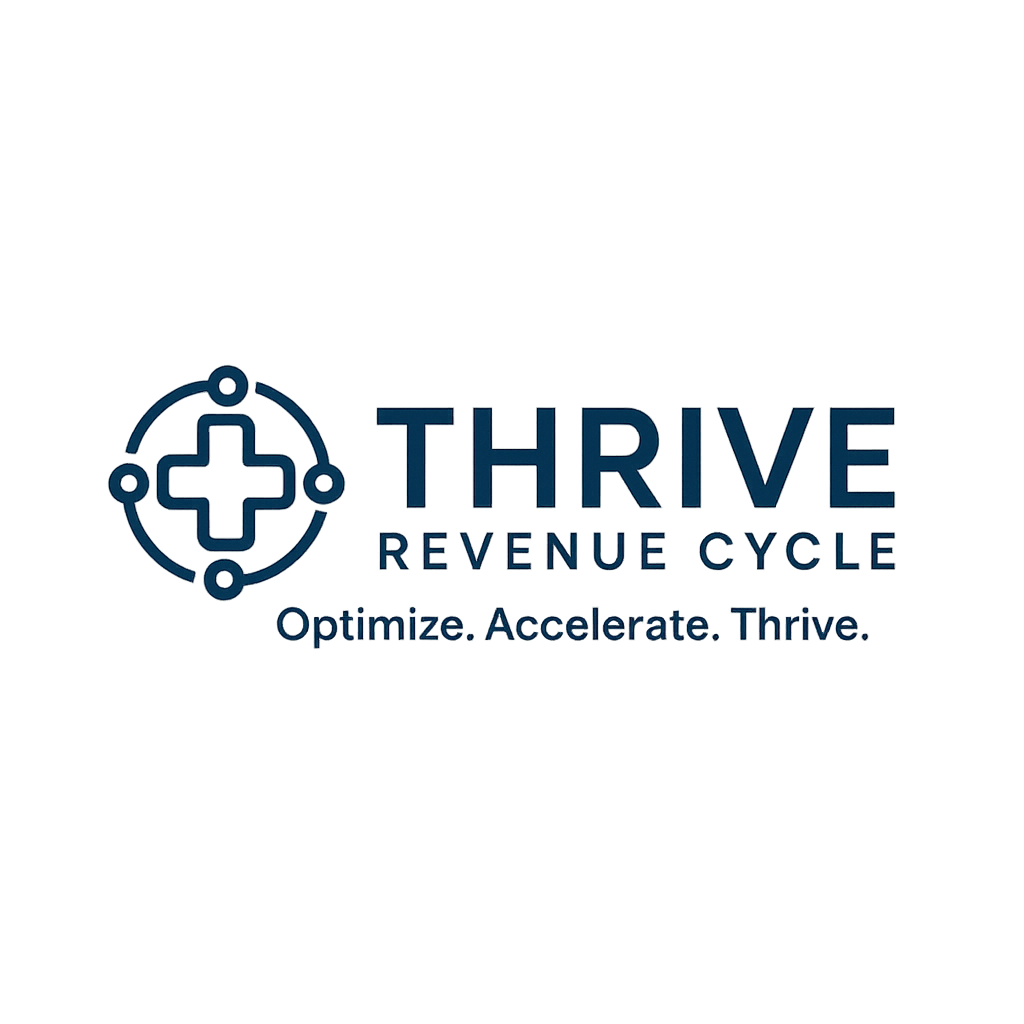AI is no longer coming for the revenue cycle—it’s already here.
From automated eligibility verification to predictive denials and real-time audit readiness, artificial intelligence is rapidly transforming how providers manage the business of healthcare. And while AI holds the potential to eliminate friction and accelerate cash flow, poor implementation—or failure to adapt—can introduce just as many risks as rewards.
At Thrive Revenue Cycle, we help healthcare organizations strategically assess, select, and implement AI-driven solutions that align with their long-term goals—not just the latest buzzwords. Below, we outline the top 5 AI trends impacting RCM in 2025, with an honest look at the benefits, risks, and consequences of inaction.
1. Predictive Denial Analytics
AI-powered denial engines are being used to analyze historical claim and payer behavior to predict and prevent denials before they happen.
✅ Pros:
- Identifies denial root causes in real time
- Prevents rework and costly appeals
- Helps train front-end and coding teams on high-risk claim patterns
❌ Risks of Adopting:
- Requires integration with clean, structured data (EHR + billing platforms)
- Can produce false positives if algorithms are poorly trained
⚠️ Risks of Ignoring:
- Missed opportunity to reduce denials by up to 30%
- Continued dependence on reactive denial management
2. AI-Driven Coding Assistants
Natural Language Processing (NLP) models can now read documentation and recommend CPT, ICD-10, and modifier codes, often before the provider finishes the note.
✅ Pros:
- Boosts coder productivity and accuracy
- Flags documentation gaps in real time
- Supports compliance with audit-ready code assignments
❌ Risks of Adopting:
- Overreliance on AI suggestions can lead to miscoding
- Still requires manual oversight to ensure payer-specific accuracy
⚠️ Risks of Ignoring:
- Slower coding turnaround time
- Higher risk of human error and audit exposure
3. Intelligent Patient Estimation & Financial Clearance
AI is increasingly used to analyze benefit data, payer contracts, and patient history to create accurate pre-service estimates, verify eligibility, and flag coverage gaps.
✅ Pros:
- Improves patient transparency and financial preparedness
- Reduces downstream denials from eligibility or auth issues
- Automates repetitive front-end tasks
❌ Risks of Adopting:
- High integration complexity with practice management systems
- Errors in estimates can harm patient trust and satisfaction
⚠️ Risks of Ignoring:
- Increased patient balance write-offs
- Delays in registration and prior auth workflows
4. Workflow Automation & RPA in Claims Management
Robotic Process Automation (RPA) and AI bots are used to complete repetitive, rules-based tasks, such as claim status checks, denial code lookups, and portal submissions.
✅ Pros:
- Saves time on high-volume, low-complexity tasks
- Reduces human error and FTE workload
- Scales easily with volume fluctuations
❌ Risks of Adopting:
- Bots must be constantly updated with payer logic changes
- May break if EHR or payer portals change structure
⚠️ Risks of Ignoring:
- Higher labor costs and slower turnaround times
- Reduced competitiveness in value-based and risk-adjusted models
5. AI-Powered Audit & Compliance Surveillance
AI systems now help compliance teams detect documentation and coding anomalies before auditors do, flagging issues like cloned notes, modifier misuse, and under/overcoding.
✅ Pros:
- Reduces post-payment recoupment risk
- Supports ongoing documentation education
- Builds payer trust through proactive compliance
❌ Risks of Adopting:
- May generate false flags without specialty-specific logic
- Requires training to act on flagged issues appropriately
⚠️ Risks of Ignoring:
- Greater exposure to payer audits and regulatory penalties
- Loss of credibility during payer contract negotiations
🔍 Thrive’s AI Strategy Lens: Technology That Aligns With Your RCM Goals
At Thrive Revenue Cycle, we don’t sell AI tools—we assess and advise on them. Our job is to help your organization determine:
- Which tasks in your revenue cycle are best suited for automation
- Whether your data infrastructure can support AI adoption
- How to avoid the pitfalls of shiny, siloed solutions that add complexity instead of clarity
💡 Client Insight: Navigating AI Implementation Successfully
“We rushed into an AI platform for denial management that created more alerts than insight. Thrive helped us step back, realign our workflows, and implement a focused, high-impact AI tool for pre-bill edits. Within 90 days, denial volume dropped by 22%, and our team finally trusted the data.”
— VP of Revenue Cycle, Hospital System (Client name redacted)
🚀 Ready to Future-Proof Your RCM Strategy?
AI isn’t optional anymore—but strategic adoption is.
Thrive can help you assess your current capabilities and define an AI roadmap that makes business sense and delivers measurable value.

